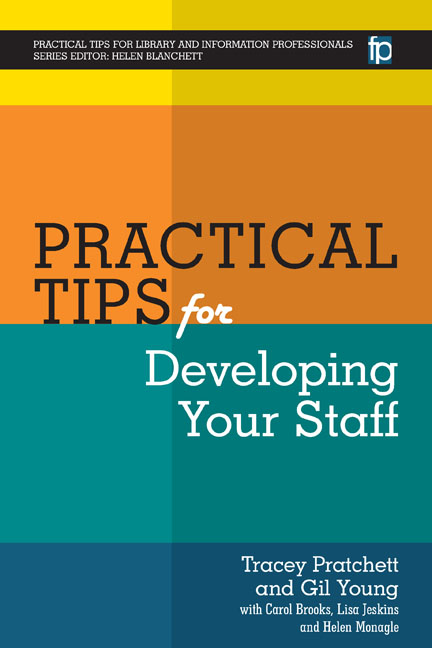Introduction
Published online by Cambridge University Press: 09 June 2018
Summary
About this book
Continuous professional development (CPD) is a key component of a successful and satisfying career. This practical book offers a wide range of ideas and methods for all library and knowledge service (LKS) professionals to manage the development of those who work for and with them. It will also be a valuable guide for individuals wishing to manage their own CPD.
As part of the Practical Tips series, it offers innovative Tips and tried-andtested best practice to enable LKS workers to take control of their professional development regardless of the budget and time available to them. You will find flexible tips and implementation advice on topics including:
• enabling others to plan, reflect on and evaluate their personal development
• appraisals and goal setting: linking personal objectives to organizational objectives
• performance management
• sourcing funding to attend and run events
• planning formal development activities such as courses and conferences
• accessing informal activities
• using social media as a development tool
• role of professional bodies and networks
• mentoring, buddying and coaching
• networking.
The Tips have been written by a wide range of LKS professionals working across different sectors and at different stages in their careers.
Section summaries
The Tips are divided into three sections:
Theories: This section of the book outlines some of the main theories around how people behave, learn and develop. Having an understanding of how individuals learn and behave is important for line managers if they are to provide meaningful development opportunities.
Infrastructure: An overview of the basic structures which need to be in place within an organization to enable learning and development to take place. This section includes information on recruitment, managing performance and exit procedures.
Activities and tools: This section covers a wide range of activities and tools which can be used to assist individuals in all aspects of their development. Many of the activities in this section will form part of an individual's day-to-day working life, including attending meetings, delivering training sessions and writing reports. The purpose of including these is to demonstrate that development can be something which happens continuously and does not necessarily require dedicated time, although that does have a role.
- Type
- Chapter
- Information
- Practical Tips for Developing Your Staff , pp. xxi - xxiiPublisher: FacetPrint publication year: 2016

